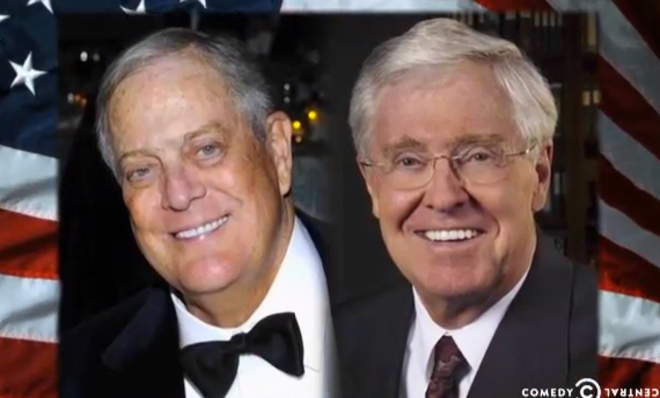Watch The Daily Show mock the Kochs' meddling in small-town politics
Jon Stewart talks about the mess in Syria, but Jason Jones steals the show from Coralville, Iowa


A free daily email with the biggest news stories of the day – and the best features from TheWeek.com
You are now subscribed
Your newsletter sign-up was successful
Jon Stewart started out Wednesday night's Daily Show with an update on the situation in Syria — the spinach the audience had to sit through, he quipped, before they got their dessert, guest George Clooney. Things aren't going well in Syria, he noted, with the recent United Nations–supported Geneva II peace talks ending in failure, leaving no end to the bombings, starvation, disappearances, and other assaults on Syria's civilian population. (Watch below)
Things are so bad in Syria, Stewart noted, that al Qaeda leader Ayman al-Zawahiri had to disown the Islamic State of Iraq and the Levant (ISIL), a brutally violent al Qaeda–affiliated group trying to overthrow Syrian President Bashar al-Assad. This schism in the terrorist group is a major challenge to Zawahiri's authority — a fact that doesn't exactly win sympathy points from Stewart.
For more on the situation in Syria, Stewart turned to senior foreign correspondent Samantha Bee, live from "Beirut." She coined a phrase — TINOs (terrorists in name only) — saying that's what ISIL is calling al Qaeda's central management. She then ended the segment with al Qaeda's response to this inter-operational challenge: A recruitment video, eerily similar to a famous Apple add, for terrorists who respect "a well-established chain of command." Watch:
The Week
Escape your echo chamber. Get the facts behind the news, plus analysis from multiple perspectives.

Sign up for The Week's Free Newsletters
From our morning news briefing to a weekly Good News Newsletter, get the best of The Week delivered directly to your inbox.
From our morning news briefing to a weekly Good News Newsletter, get the best of The Week delivered directly to your inbox.
The highlight of Wednesday's show, however, was Jason Jones' excursion to Coralville, Iowa, a town of 20,000 that had a nasty mayoral race last cycle. (Watch above.) Jones talks to Mayor John Lundell, who was the target of a sleazy direct-mail campaign. It's a classic Jones interview, ending with the mayor laughing and uttering a mild explicative.
Jones moved on to a city council candidate, Chris Turner, who was supposed to benefit from the mailings. Turner had nothing but nice things to say about the incumbents who beat him, including Lundell. Only then did Jones unveil the source of the attack ads: Brothers David and Charles Koch and their deep-pocketed super PAC, Americans for Prosperity. "Tired of losing in big national elections," Jones explained, "they're embracing a new strategy of buying wins in local races, using national-style cutthroat tactics."
The tactic didn't work in Coralville, or anywhere else it turns out. Turner says that when Americans for Prosperity entered the race, it was "kind of like being endorsed by Charles Manson." He tied for last place. To find out why these "yokels" didn't "embrace the future of small-town attack-ad politics," Jones interviewed "big city super-PAC sympathizer Matthew Vadum," a conservative author and polemicist.
At this point in the interview you have to wonder why conservatives agree to appear on camera with The Daily Show. Vadum, though, took to his assigned role with relish. He called (presumably) the residents of Coralville "small-minded" for rejecting attack politics, and defended the misleading mailers by arguing that private organizations have the right to try and influence elections. That takes a bit of showmanship, Vadum added.
A free daily email with the biggest news stories of the day – and the best features from TheWeek.com
So Jones confused everyone at a Coralville town hall meeting by doing a song-and-dance number, a la Harold Hill in The Music Man. Yeah, I don't know what to make of it either. He then confronted Vadum with Turner's statement that he's happy he lost, since it might help shoo the Koch brothers away from Coralville. Vadum said Turner took the wrong lesson from the election.
When Jones asked what the right lesson would be, Vadum was stumped for a comically long time, then finally offered this: "There's nothing he can do about another group coming in." That's probably bad for small-town America, but promising fodder for Daily Show writers down the road.
Peter has worked as a news and culture writer and editor at The Week since the site's launch in 2008. He covers politics, world affairs, religion and cultural currents. His journalism career began as a copy editor at a financial newswire and has included editorial positions at The New York Times Magazine, Facts on File, and Oregon State University.
